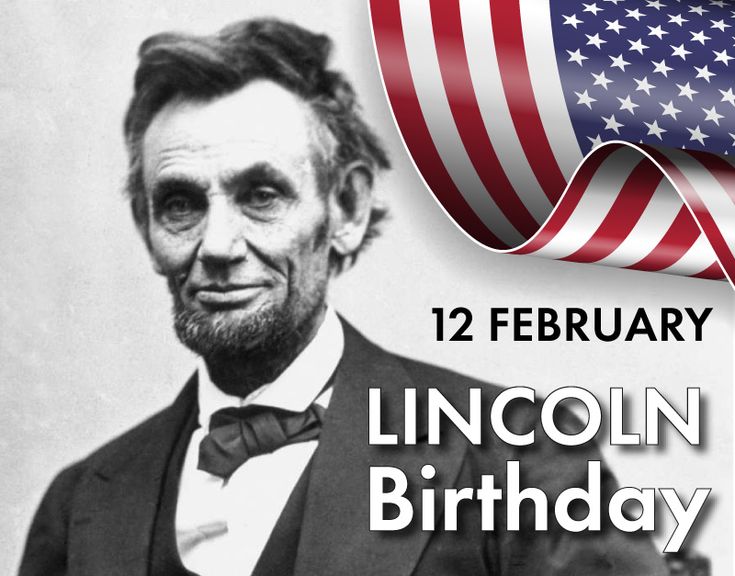Abraham Lincoln’s Birthday: Celebrating a Legacy of Freedom and Leadership
Abraham Lincoln, the 16th president of the United States, is one of the most revered figures in American history. His leadership during one of the most tumultuous times in the nation’s history – the American Civil War – and his efforts to abolish slavery, preserve the Union, and promote equality have cemented his legacy as a hero. Every year, on February 12th, people across the country celebrate his birthday, reflecting on the remarkable impact he had on the course of American history.
History of Abraham Lincoln’s Birthday
Abraham Lincoln was born on February 12, 1809, in a log cabin in Hardin County (now LaRue County), Kentucky. Raised in poverty, Lincoln’s early life was marked by hardship, but his innate intelligence and strong work ethic led him to become one of the most influential leaders in American history. Overcoming his humble beginnings, Lincoln worked as a lawyer, served in the Illinois State Legislature, and was elected to the U.S. House of Representatives before eventually becoming president in 1861.
His presidency is defined by his leadership during the Civil War, a war fought over the issue of slavery and states’ rights. Lincoln’s efforts to preserve the Union and his eventual issuance of the Emancipation Proclamation in 1863, which declared the freedom of slaves in Confederate-held territories, changed the course of American history forever. His unwavering belief in equality and his efforts to heal the nation after the war, though tragically cut short by his assassination in 1865, have solidified Lincoln as a symbol of integrity, leadership, and dedication to the cause of freedom.
In the early 1900s, various states began observing Lincoln’s birthday as a holiday. The celebration was eventually merged with George Washington’s Birthday in 1885, creating what we know today as Presidents’ Day, observed on the third Monday of February. However, Lincoln’s birthday is still honored by many states and institutions as a separate day of commemoration on February 12th.
Significance of Abraham Lincoln’s Birthday
Abraham Lincoln’s birthday is a time to honor his life, his presidency, and the profound impact he had on the United States and the world. Here’s why his birthday remains significant:
- Emancipation and Equality: Lincoln’s Emancipation Proclamation, while not immediately freeing all slaves, set in motion the abolition of slavery in the United States. His actions paved the way for the 13th Amendment, which permanently abolished slavery. His birthday is a reminder of the struggle for racial equality and justice that continues to shape the nation’s history.
- Preservation of the Union: Lincoln’s leadership during the Civil War is often cited as a model of resilience and determination. His ability to navigate political divisions, military challenges, and a deeply fractured country helped preserve the Union and laid the foundation for the United States as we know it today.
- Leadership in Crisis: Lincoln’s ability to lead during one of the most challenging periods in American history is a testament to his political skill, moral courage, and commitment to the greater good. His birthday is a celebration of leadership that rises above division and unites a nation for a common cause.
- Democracy and Civil Rights: Lincoln’s vision of democracy and his belief that all men are created equal continue to inspire movements for civil rights around the world. His birthday serves as a reminder of the ongoing fight for social justice, human rights, and equality for all people, regardless of race or background.
- Enduring Legacy: Lincoln’s legacy continues to shape the ideals of freedom, justice, and equality in the United States. On his birthday, Americans reflect on how his values continue to influence not only national policy but also individual lives and actions.
Observing Abraham Lincoln’s Birthday
Abraham Lincoln’s Birthday is observed in different ways across the country. While it is not a federal holiday, some states still observe it as a day of remembrance and celebration. Here’s how people commonly mark the occasion:
- Educational Programs and Events: Schools, museums, and historical sites across the United States often host special programs on February 12th to educate the public about Lincoln’s life and legacy. These events may include lectures, reenactments, and displays about Lincoln’s presidency, the Civil War, and the abolition of slavery.
- Reflection and Tribute: Many people use the day to reflect on Lincoln’s principles of equality, liberty, and democracy. Some individuals visit Lincoln’s memorial in Washington, D.C., or other historical landmarks associated with his life, paying tribute to his contributions to American society.
- Community Gatherings and Charitable Work: Given Lincoln’s emphasis on empathy and service, some communities observe his birthday by hosting events that promote unity and community service. This may include charity drives, volunteering at local shelters, or coming together to support important social causes.
- Government and Civic Ceremonies: In some states, government officials and civic leaders mark Lincoln’s birthday with formal ceremonies. These events often include speeches that highlight his political contributions and reflect on his role in shaping American democracy.
- Cultural Celebrations: Across the country, cultural organizations and theaters may organize special performances, including plays, readings, and film screenings, to celebrate Lincoln’s life and his role in American history.
Facts About Abraham Lincoln’s Birthday
- Born in 1809: Abraham Lincoln was born on February 12, 1809, in a log cabin in Kentucky, growing up in a poor family with limited access to formal education.
- Civil War Leadership: Lincoln served as president from 1861 to 1865, guiding the United States through the Civil War, a period of extreme division and conflict over the issue of slavery.
- The Emancipation Proclamation: In 1863, Lincoln issued the Emancipation Proclamation, which declared all slaves in Confederate-held territories to be free. This action is regarded as one of the most important steps in the abolition of slavery.
- Assassination: On April 14, 1865, Abraham Lincoln was assassinated by John Wilkes Booth while attending a play at Ford’s Theatre in Washington, D.C. He died the following day, leaving a lasting legacy that continues to inspire.
- Presidents’ Day Connection: Although Presidents’ Day was created as a combined holiday for George Washington and Abraham Lincoln, many states still celebrate Lincoln’s birthday as a distinct observance on February 12th.
Frequently Asked Questions (FAQs)
- Why is Abraham Lincoln’s Birthday important?
- Lincoln’s birthday is important because it allows Americans to reflect on his pivotal role in abolishing slavery, preserving the Union, and promoting the values of equality and justice.
- Is Abraham Lincoln’s Birthday a national holiday?
- No, Lincoln’s birthday is not a national holiday, but it is observed by some states and institutions as a day to honor his contributions to the nation.
- How can I observe Abraham Lincoln’s Birthday?
- You can observe Lincoln’s birthday by attending educational events, reflecting on his legacy, supporting charitable causes, or visiting historical sites related to his life.
- What did Abraham Lincoln accomplish during his presidency?
- Lincoln is best known for leading the United States through the Civil War, issuing the Emancipation Proclamation, and preserving the Union. He also worked to expand civil rights and ensure equality for all Americans.
- What is the connection between Lincoln’s Birthday and Presidents’ Day?
- Presidents’ Day, observed on the third Monday in February, was originally intended to honor both George Washington and Abraham Lincoln. Many states still celebrate Lincoln’s birthday separately on February 12th.
Conclusion
Abraham Lincoln’s birthday serves as a reminder of the enduring principles of freedom, equality, and leadership. On this day, we celebrate not just the man himself, but the values he championed and the progress he helped bring about. Whether through reflection, education, or community service, Lincoln’s birthday is an opportunity to honor his legacy and continue working toward a more just and united world.











Hello .
Hello. A 12 cool site 1 that I found on the Internet.
Check out this website. There’s a great article there. https://prawouam100.org/zaklady-sportowe/zaklady-na-zywo-czy-oplaca-sie-je-obstawiac/|
There is sure to be a lot of useful and interesting information for you here.
You’ll find everything you need and more. Feel free to follow the link below.
Hello men
Good evening. A 13 fantastic site 1 that I found on the Internet.
Check out this site. There’s a great article there. https://caledoniasiu.org/betting-backstage/the-evolution-of-casino-games-from-ancient-dice-to-online-slots/|
There is sure to be a lot of useful and interesting information for you here.
You’ll find everything you need and more. Feel free to follow the link below.
Hello comrades
Hello. A 13 very cool site 1 that I found on the Internet.
Check out this website. There’s a great article there. https://elefantessolidarios.org/sport-betting/the-psychology-behind-betting-on-underdogs-why-we-love-a-good-upset/|
There is sure to be a lot of useful and interesting information for you here.
You’ll find everything you need and more. Feel free to follow the link below.